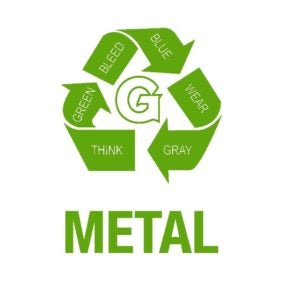Metal Recycling

The Facilities Management team is proud to announce the launch of metal recycling at Georgetown GU-Q.
The production of new metal releases a far greater amount of greenhouse gas emissions compared with making products from recycled metal. These emissions may influence climate change and may also cause harmful levels of air pollution in cities, resulting in potential respiratory health problems for you and other residents.
Metal recycling conserves natural resources by reducing greenhouse gas emissions and using less energy than making metal from virgin ore. The Institute of Scrap Recycling Industries (ISRI) reports that recycling metal may cut greenhouse gas emissions by 300 million to 500 million tons.
In addition, using scrap metal in lieu of virgin ore generates 97% less mining waste and uses 40% less water, according to the National Institute of Health.
Want to leave a smaller carbon footprint? Here are some ideas:
Reduce your Consumption of Metal
- Rather than using foil wrap and disposable pans, use reusable food containers with lids.
- Repair household appliances rather than buying new: Don’t throw out your vacuum cleaner if it isn’t picking up. Check the bag and the belt and make sure the hoses are free of clogs.
- Buy for durability: Whenever possible, choose a product that you will use for a long time and be able to maintain and repair should it be necessary. It may cost a bit more up front, but it will save waste and money in the long run.
- Borrow, lend, share: Consider sharing tools and household equipment (ladders, hammers, garden tools) with friends and neighbors
- Sell or give away working items you no longer need rather than throw them out.
Recycle What you Cannot Reuse
What can you put in our Metal recycling bins at GU-Q?
- Empty Soda Cans
- Clean Foil Trays
- Scrap Metal
- Empty Aerosol Cans
What you cannot put in our Metal recycling bins at GU-Q?
- Used Batteries
- Dirty Tin Cans
- Non- Metal Materials
- Dirty Tin Foil
Why they cannot go in?
- Used Batteries: There are so many different types of batteries and various approaches and factors to consider when recycling them. Lithium-ion batteries store a lot of energy, and if crushed, they can spark and create dangerous fires. The batteries should be thrown in special E-waste bins that accept batteries.
- Dirty Tin Cans: When dirty/non-empty cans are tossed in the metal recycling bins, the process of baling ends up squeezing out whatever’s left, making a mess on the belts, during the recycling process. Be sure to empty and rinse all containers before recycling.
- Dirty Tin Foils: It needs to be clean — that is, free of food residue, as grease or food residue can contaminate the other recyclables during the recycling process. Because of the issues with contamination, and the reality that most people are unlikely to rinse their aluminum foil before recycling it, some waste haulers will not accept aluminum foil for recycling; the damage soiled aluminum foil does to other recyclables can outweigh the benefit of trying to recycle the aluminum foil.
Recycling bins are located in the following locations:
- Atrium
- Faculty/Staff Lounge
- Student Lounge
- Larger items or amounts can be dropped off directly to the Metal Recycling Cage in the loading dock
What Happens to the Recycled Metal?
- The metal is delivered to the Lucky Group, located in the New Industrial Area, and then sent to a facility in Jebel Ali for recycling. For more information, please visit www.luckygroup.com.